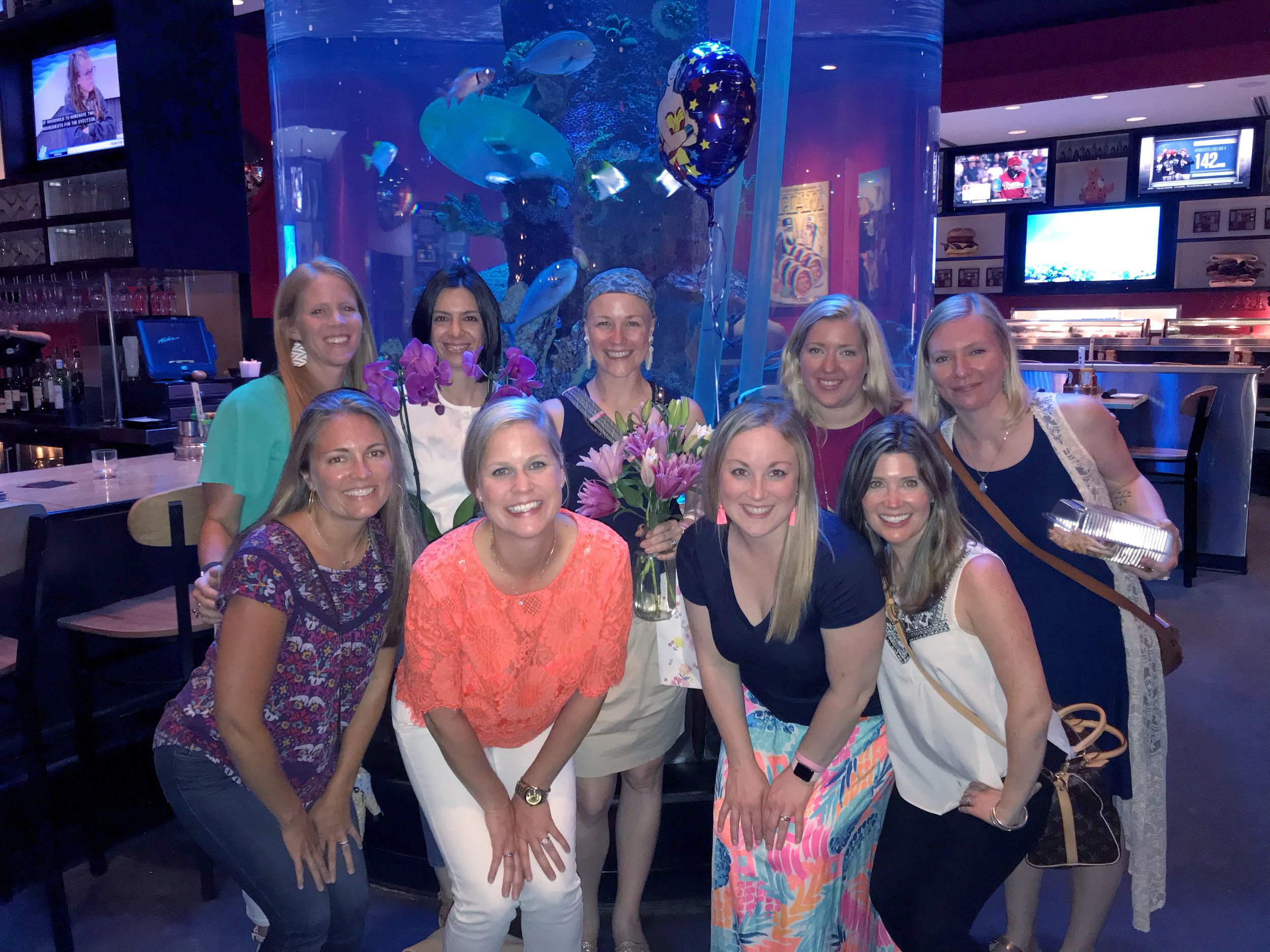The pathology report comes back
I finished chemo on July 26.
I had a bilateral double mastectomy exactly four weeks later on August 23.
Two big ticket items off our increasingly shrinking cancer to-do list!
I started writing a blog post that walked you through my day in surgery, and you’ll hear about that eventually.
Instead, I decided to switch gears after receiving a call on Monday.
And not just any call. It was THE call.
It was my breast surgeon, Dr. Jendro, calling to go over the pathology report from surgery.
My breast surgeon, Dr. Jendro. I met her two days after I found my tumor, and she's been an incredible support throughout this process.
Here’s what I knew about surgery: all of my breast tissue was sent into the lab for testing – including the tissue from the right side (non-cancerous side). One lymph node was removed. I knew the surgery went according to plan and there weren’t any big surprises except that my plastic surgeon couldn’t fill the expanders as much as he wanted to (I’m currently at 150cc rather than the 200cc he was hoping to fill me to).
Although I was expecting Dr. Jendro’s call on Monday, it still caught me off guard. I flashed back to the day at the end of March when she had called to tell me that my biopsy was positive for cancer.
I remember keeping it together long enough to hear her say the next steps in the process.
I remember Carl answering his phone at work and all I could say was “She called.”
I started bawling.
He said, “I’m on my way home.”
So, here we are again.
She called.
“It’s Dr. Jendro. I have some awesome news. Your pathology report came back that you have no residual evidence of cancer in your tissue.”
“What does that mean?”
“It means the chemo worked! It killed everything it was supposed to.”
“What about the lymph node?”
“It tested negative for cancer during surgery.”
“So I have no cancer?”
“No cancer!”
“Can I say now that there’s 'no evidence of disease’?”
“You can!”
No evidence of disease is basically an equivalent to remission, if you’re more familiar with that term.
My mom happened to be at my house at the time. You could physically see the weight on her shoulders lifted when I told her the news.
I called Carl and my sister.
I texted my close friends.
Everyone was ecstatic.
Me?
I wasn’t sure how to respond.
Don’t get me wrong - to hear that you no longer have cancer is a relief. When you’re given stats and percentages and labeled with an “aggressive” receptor, there’s so much that goes through your head that you don’t necessarily expect things to go the way you want them to.
I mean - I didn’t want to be here in the first place. I’m one of the 5% of women under 40 diagnosed with this crazy thing. The stats weren’t exactly in my favor from the diagnosis.
But here I am getting the call that so. many. people. want to get. People that I’ve sat alongside in the waiting room and in the infusion room. People that I’ve met on Facebook and Instagram and through friends. People who are going through this process. People who are supporting their spouse or child going through this process. People I will never get the chance to meet.
And I got the call.
Yes, many of us will get the call.
But why certain ones and not all of us? Why does my regime get to work for me, but another friend will be on chemo the rest of her life?
This is rhetorical.
I’m not looking for your answers.
In fact, I don’t think any of us have the answer, but that doesn’t mean it’s not worth questioning.
My thought process is inline with what’s called survivor guilt. It’s a very normal feeling, especially for cancer patients who receive the call.
When I mentioned how I was feeling to one of my good friends this week, she said “It’s like infertility, isn’t it? Why did it work for us but yet there are thousands of fantastic couples who aren’t getting the children that their hearts’ desire?”
Yes! It’s so much like infertility.
When I went through infertility I experienced a wide range of emotions.
Carl and me pre-kiddos in November 2013. We would find out on January 1, 2014 that the seventh round of infertility treatment worked!
Every time I saw a news story about an abused child, I thought “WHY?!” Why did YOU, neglecting parent, get the privilege of having a baby over me? Over her? Over them?!"
Finally, after two and a half years, we got pregnant, and I became an advocate for women living in the dark valley of pleading with God for a baby. I made sure these women knew I cared, and I called people out for insensitive questions and remarks that can cut a tender heart so deeply. Questions that are so well-meaning, but so hurtful in the same breath. I took on the emotions of those living with what I had lived with for so long.
Four years past the birth of our infertility baby and the feelings aren’t quite as raw as they were back then. I’m still passionate about supporting those women and families that want a baby, but I’ve learned how to use my passion in a way that supports and cares for those women. I don’t harbor as many of those unchecked, raw feelings, and, instead, I use them as fuel to make people feel loved and seen.
When I explained my feelings of survivor guilt with a large Facebook group of international women that share my diagnosis, I asked them how they handle those feelings.
Some women didn’t even realize it was normal to feel that way, and they had not experienced it.
A few didn’t realize their feelings had a name.
A couple of answers stood out to me:
"I have always tried to pay it forward with my experience, be always grateful no matter what the circumstance.”
"Pay it forward. Be encouraging. Always grateful."
And then one woman shared the story that while she overcame her breast cancer diagnosis, she lost both her sister and brother-in-law to cancer. Two people very, very close to her.
She said, "I didn’t really handle it, it diminished over time."
And that’s when I realized, that, over time, my heart continues to heal the deep wounds that left me frustrated and angry during the infertility process. I share my experience. I support other women and couples going through it now. I do what I can to be an active cheerleader, encourager, and helper.
It’s my hope the same will occur with my cancer experience. In fact, I think it already has in some ways:
- I check in with people that are going through their own diagnosis. I say hello, ask how they are doing. I listen for ways to support them.
- I’m actively looking for ways to share my story so that others might be encouraged in the face of tough life situations (cancer or otherwise).
- I’m much more aware of my words than I have ever been. I know words can leave the longest lasting impression and we must choose each one incredibly carefully.
As I write this list, I realize that this isn’t so much about survivor guilt as it is realizing that life is about supporting each other through happy events, unexpected obstacles, and all of the in between. Life isn’t about who has it worse or how to be the best at living (if that could even be a thing). Life is about how we tackle all the things – together.
Life is about our influence. It’s about our capacity to have an effect on the character, development, or behavior of those around us. (Read more about my theory here.)
For those of you that continue to support me during this treatment process, thank you. I could not do it without your help.
For those of you that read this and think “When will I get my call? Where is my good news?”, I desperately hope you get that good news. But until you do, I hope I can play even the smallest role of you feeling loved and encouraged on whatever journey you’re currently on.
Just a small sampling of the many, many friends who are supporting me throughout this process. Thank you all for celebrating my August milestones with me!



